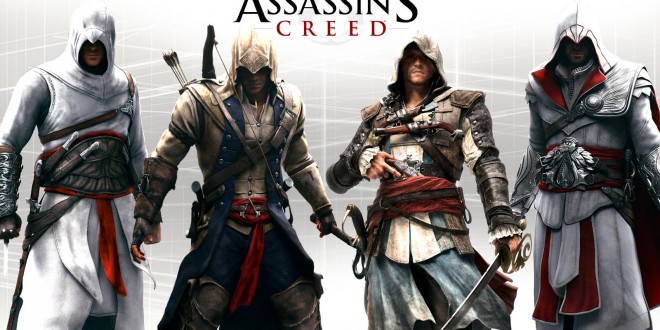As of April 2014, the Assassin’s Creed franchise has sold over 73 million (!) copies. Because of that staggering number, one could easily argue that Ubisoft’s “climb anything and assassinate anyone” series is one of gaming’s most successful. Said saga contains six main entries, with two more coming up this fall (Unity and Rogue). But how would you rank them? Even with Assassin’s Creed III’s refined parkour or Assassin’s Creed IV: Black Flag’s massive open-world, some feel like the series’ highest point still belongs to Assassin’s Creed II. On the flip-side, Assassin’s Creed: Revelations seems to be least-impressive title, simply because it didn’t bring anything new to the table. Here’s how I would rate them…
6. Assassin’s Creed
When the game débuted back in 2007, everyone was amazed by its smooth platforming, intriguing “assassins versus templars” story spanning thousands of years, and the all-too-badass hidden-blade assassination techniques. However, there is one flaw because of which the original Assassin’s Creed is ranked the lowest on my personal list, and that is the highly repetitive gameplay which asks you to perform the same three types of investigations before confronting your main target. Seeing as there are nine such enemies to kill, the whole affair gets quite tedious about half-way through. It’s a solid title when compared to similar games in the genre, but just an okay experience when compared to other Assassin’s Creed games.
5. Assassin’s Creed: Revelations
After two main instalments taking place at the height of the Renaissance in Italy, Ezio decides to further delve into the assassins’ history by visiting Constantinople. By the time Revelations hit, gamers were so used to Assassin’s Creed’s usual gameplay mechanics that Ezio’s final chapter didn’t do anything different to warrant their attention. Even worse – its tower-defence mini-game was so out-of-place (and clumsy, to be honest) that it made some players downright hate Revelations. Ironically, the best sequences in said title feature Altaïr and how he became the leader of the original assassin order. At the very least, Assassin’s Creed: Revelations features a fitting end to Ezio’s life as an assassin.
4. Assassin’s Creed III
Ah, yes – yet another game hyped to no end only to be a disappointment (speaking of Ubisoft titles – Watch Dogs, anyone?). Assassin’s Creed III features an amazing upgrade in fluidity to its parkour mechanics, enhanced combat, and it’s the first title in the franchise to include dynamic weather, seasons, and naval combat. So what went wrong? Apparently, the protagonist went wrong. Connor (or Ratonhnhaké:ton for purists) is as bland as main characters get, featuring zero personality. Additionally, his inclusion in historical moments such as the declaration of independence feels kind of forced, to be honest. The story isn’t as captivating as those of its prequels, and – ironically – the most interesting character is the game’s fan-favourite Haytham Kenway. Being built on the Anvil Next engine, Assassin’s Creed III’s gameplay is refined and a joy to experience. Unfortunately, the story and characters are not.
3. Assassin’s Creed: Brotherhood
I am honestly torn apart between Assassin’s Creed: Brotherhood and Assassin’s Creed II, but I’ll put the former on #3 just because its story isn’t as captivating as AC II’s. Having said that, Brotherhood is definitely an upgrade in the gameplay department, featuring a massive city to play in (Rome), a slew of side-missions, weapons, costumes, and businesses to purchase and upgrade, in addition to allowing the protagonist to call other assassins to his aid whenever he wants for the first time in the series. It takes everything from its prequel and doubles it, which results in hours upon hours of fun.
2. Assassin’s Creed II
When Ubisoft had revealed the first gameplay video for Assassin’s Creed II, it was love at first sight. Everything was bigger and better when compared to its prequel – dual hidden-blades, multiple weapons to purchase, an economic system, and Renaissance Italy was a welcomed change of scenery from the original’s dusty cities. But what absolutely sold me was its protagonist – Ezio Auditore da Firenze. In the beginning, Ezio is the usual cocky teenager throwing his money on booze and women; he’s brash, ignorant, and picks a fight whenever he can. When tragedy befalls on him and his family, however, Assassin’s Creed II starts to showcase a slow-but-steady process in which Ezio gets more mature, sequence by sequence. Even if his adventures continue in Brotherhood and Revelations, Ezio’s tale could have easily ended with #2, which says a lot about the story’s quality.
1. Assassin’s Creed IV: Black Flag
I find it ironic that Assassin’s Creed IV: Black Flag is my favourite Assassin’s Creed game so far, simply because its protagonist acts nothing like an actual assassin. Edward Kenway shares many of Ezio’s traits before he’s forced to grow up – he’s brash, totally ignorant, looks out only for himself, will do anything to get rich, and he certainly doesn’t shy away from a fight. That said, his charismatic nature coupled with a fun cast of allies (e.g. Edward “Blackbeard” Thatch, Adéwalé, or Mary Read) make for an entertaining story to get through. Black Flag also puts more focus on stealth-missions – which is (again) ironic, seeing as we’re playing as a pirate – in addition to the naval combat being easy to get into and incredibly fun to experience. Add to that a slew of treasures (underwater or not) to discover, hunting on land or at sea, and completing every last side-quest, and you’ll be playing Assassin’s Creed IV: Black Flag for weeks on end.
Agree? Disagree? Let me know in the comments below.
 Load the Game Video Games, Reviews, Game News, Game Reviews & Game Video Trailers
Load the Game Video Games, Reviews, Game News, Game Reviews & Game Video Trailers



